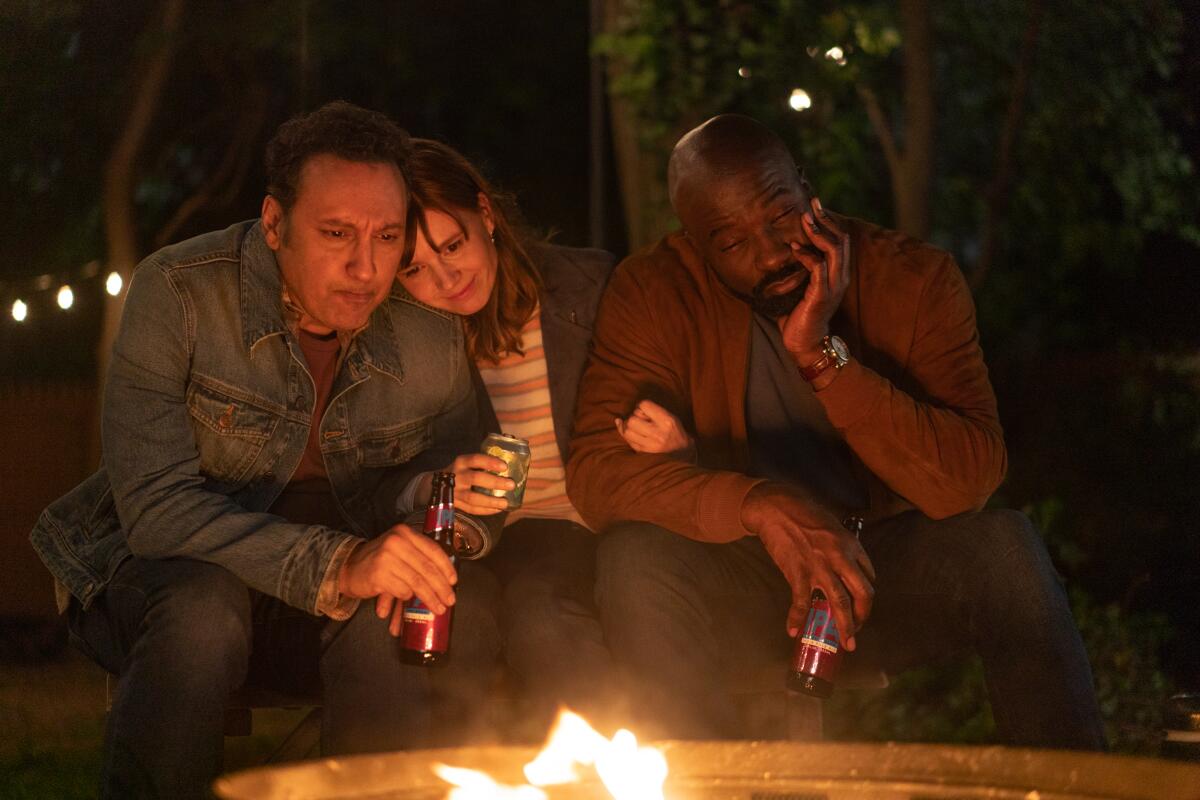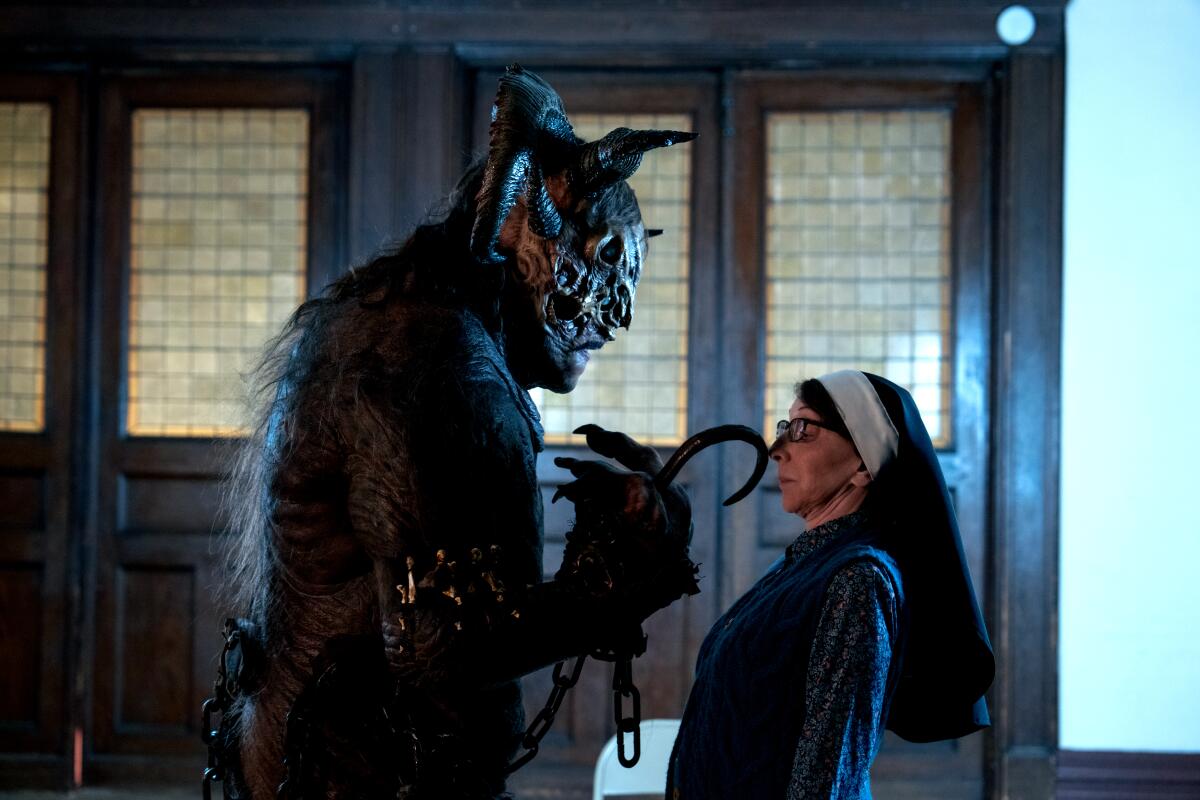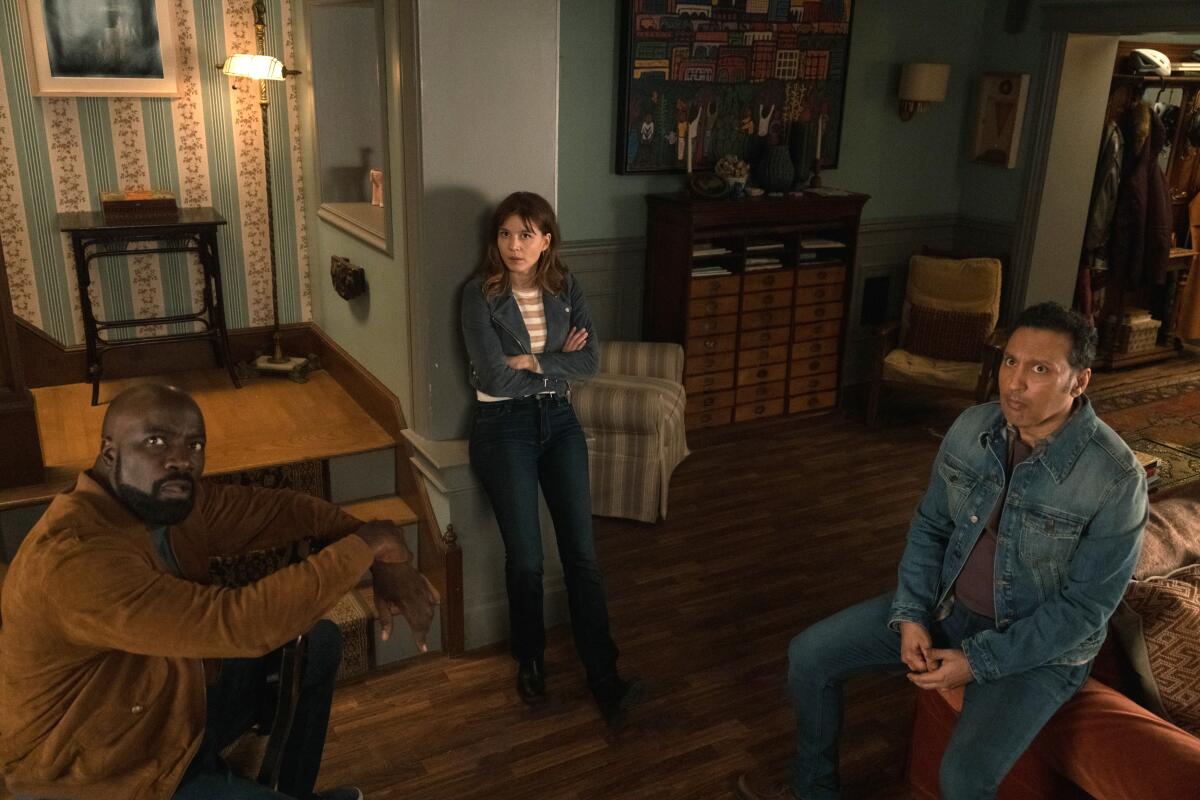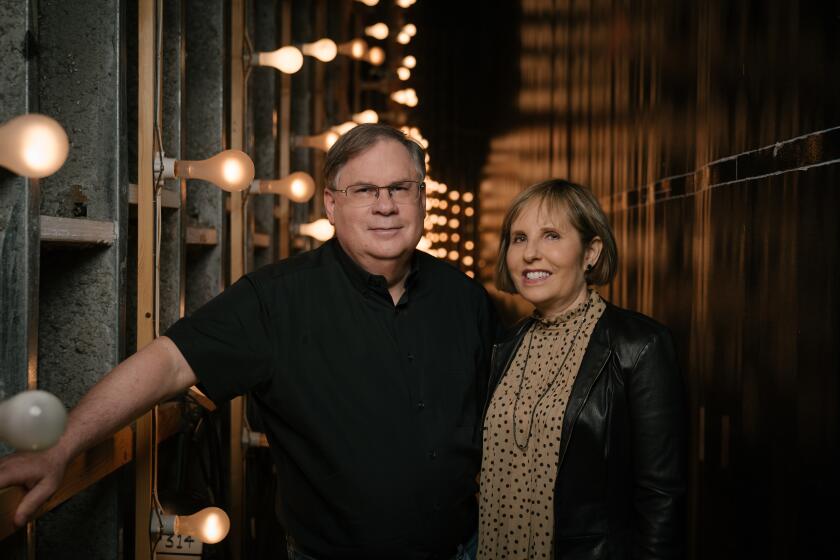Can the Antichrist save ‘Evil’? The co-creators and star explain the show’s finale and future

- Share via
This article contains spoilers for the series finale of “Evil” on Paramount+.
“Evil” came to a conclusion Thursday much like it began — with its protagonist confronting the enigma of evil in front of her.
Four seasons ago, viewers met New York-based forensic psychologist Kristen Bouchard (Katja Herbers) as she was assessing the mental capacity of a serial killer whose lawyer suggests his client is possessed by a demon after he murdered three families but claimed to have no memory of the murders. Now, she’s uprooted to Rome with her family, including her son Timothy — the purported Antichrist — whom she now has care over. In the closing moments of the series finale, titled “Fear the End,” she’s startled when the baby’s eyes flicker to white and sharp fangs briefly appear along his gums, signaling something is amiss. But the mother carries ahead with her workday, choosing to ignore the concerning development.
It’s a moment that underscores how much the character has evolved in the intervening years after becoming an assessor of potential demonic possession and other supernatural occurrences for the Catholic Church —alongside her work besties, priest David Acosta (Mike Colter) and tech whiz Ben Shakir (Aasif Mandvi). It also showed how her motherly instincts have guided her decisions all along, and will continue.
Over a video call with Robert and Michelle King, the husband and wife creators of “Evil,” in New York and Herbers in Amsterdam, The Times spoke with the trio about the show’s ending, the Antichrist twist, and the not quite fairy tale conclusion for Kristen and David. Here are edited excerpts from the interview.
Robert and Michelle King, the pair behind ‘The Good Fight,’ aren’t aiming for Shakespeare. But they’ve made the audacity of immediacy into high art.
Finales can be tricky things to pull off, given how invested viewers are with the characters and their hopes for them, and how immediate their feedback can be. What was your vision for the ending of “Evil”?
Michelle King: We wanted to end the story in a way that was satisfying to the viewers and felt like a conclusion and, yet, still allowed for the option of telling more stories, if that were ever a possibility.
Robert King: In general, our attitude toward endings is cheerful cynicism. That it’s something that left you, hopefully, with a smile, but also is honest enough to say, in this case, evil doesn’t go away. Evil is there. But at least Kristen and David are in the same universe. Everybody that the audience cares about is still alive, and yet, that’s honest to what’s going on right now.
Had you known how you wanted to end the series from the start, or was it something that revealed itself later?
Robert: I think later, with the trope of the Antichrist and the idea of nurture versus nature. The question always at the end of the series was nature versus nurture, and I think it got changed —I’d loved to hear Katja’s thoughts on this because it changed on the set through Katja’s influence. In the script, she looks at the baby and isn’t sure if she saw what she saw — that there was a demented look or the eyes changed and turned red, and there were jaws. Then the light changes, and it’s like, maybe it was that? Katja’s idea, which I’m thrilled by, was that she sees that it’s demonic and covers for it, which plays into the idea of mothering, which has been the very nature of the character from the very beginning.
Katja Herbers: Kristen has such a maternal instinct. Was it Season 3 where she has that nightmare, goes downstairs and finds, truly, a monster in every sense of the word, and she still wants to nurture it? She even starts breastfeeding that demon. [With that Antichrist moment,] I really wanted to tease, should somebody want to make more of the show. I liked that idea of ending it in a similar sense to the first season where [Kristen wonders], “Am I possessed or not?” And then that look [from that moment in the first season ] that I remember having email conversations with Robert and Michelle about — they were looking for something that was more an amusement to the horror, which is something that Kristen’s flirted with a lot. I thought with that ending, to combine those things of, “I can probably love this child enough so that it’ll turn out well; I can love the demon away,” and an amusement to this idea of, “What is this going to bring?”

Tell me more about what your reaction was to learning Kristen’s fate, Katja. Were you surprised that, after being against it, she uprooted her family to Rome?
Katja: I think if Andy weren’t out of the picture, that would not have happened. I was not surprised that she chose to do it. We’ve seen her love her job and her coworker plenty to want to potentially make that leap. As David says, it’s only six months, and then I can decide. I love how Robert and Michelle wrote that she takes cues from her Dutch dopple[ganger]. Why pass up that opportunity? She knows what life is like in Queens. That’s probably good life advice, anyway: go for it sometimes.
How do you categorize what happens with the show’s most sinister character, Leland Townsend (Michael Emerson)? We don’t see him actually die.
Michelle: First of all, Michael Emerson is heaven — and more than any other actor I’ve ever worked with, is the complete opposite of the character he plays. He is such a nice person, and Leland is such a dreadful character. But in terms of the pleasure of where it ends, he’s always been a force to be reckoned with. By the end, they reckon with him, he is taken down. If you’re being optimistic, you will say he’s been taken down for good. They have not succumbed to murder, so they’ve triumphed ethically as well. But it’s a cabinet, and people get out of cabinets.
Robert: The difficulty with doing a show that goes more than one season is how do you keep the status quo alive but have a developing arc? And since Katja’s character had murdered in the first season and been forgiven in the second season, or ignored by the police in the second season, it was difficult to go right back to that well. Because where is the development then? So there’s an indulging into the supernatural side of the show. If there is a supernatural, this cabinet is the perfect place to hold him. And just as we saw with the second season, boxes are not always safe.
We know the decision to end the show was not your own. How many more seasons would you have gone?
Robert: Two more. The fifth season, which was the collapsed four episodes, would be one of those, and then one more. That always seems like a good shape for things. Also, the show very much, like all the other shows, reacts to the culture. How the world can turn 180 degrees in a heartbeat and then, and then turn again and turn again. We’re in this accelerated world that I think would become the subject of the fifth season.
The show has had fun leaning into the supernatural elements, and exploring this tension of the evil that lurks among us. Real world events maybe played less of a role in this series than your others, but still functioned as a metaphor. What will you miss about being able to process the world around you through these characters?
For the record:
9:06 a.m. Aug. 23, 2024A previous version of this article mischaracterized a statement by Robert King as implying that the attempted assassination of former President Trump was meant to bring attention to Trump. King was referring to the motives of the gunman.
Robert: Obviously this election will be interesting for pointing out other elements of evil. Clearly, an assassination attempt [against former President Trump] that just seemed to be about bringing attention to himself [the gunman] instead of making some political point. It goes back to the very first episode, when Mike’s character David says, “Evil is in communication with itself and that’s why it’s getting worse.” In many ways, it’s not getting worse. There’s no Stalin killing millions. But it’s a little more on every street corner.
I do think artificial intelligence, especially generative, we only scratched the surface because it was written [into the series] so much more before it started taking over our economy. But a gen AI would be much more played, either through those characters who were very interesting in that ninth episode or in creating new versions of it, but to be in communication with your dead loved ones or with people you miss is just both frightening and almost like something out of Homer. You wish you could go deeper into that. The other thing is, the doppelgangers, which we thought would be taking over more of a season, but then we decided, “Well, it’s a way to ease our leads back into their real lives.” Because Aasif’s real wife and child in that doppelganger story, and then Katja, obviously, is Dutch.

The dynamic between David and Kristen is something that fans really pore over — they ship them. What has interested you about the discussion within the fandom when it comes to them?
Katja: I’m really in awe of people who are out there making these [video/image] edits. I just think people are so talented. I love what they choose to put in them. It’s these little gifts that you get. I like sometimes when people try to not ship me with David, but are rooting for ... a genuine friendship. These people do truly care for each other and talk to each other in a very real way. We have that scene in the finale where we’re throwing our old cases in the fire, and we talk about what we’re going to miss or something. David says something about talking about real things — and I think that’s a very beautiful thing to see on TV.
Michelle: When we did it before — the “will they, won’t they” — it was in “The Good Wife” and Alicia was just questioning whether she should stay in a tainted marriage — I don’t know how else to put it — versus go with someone she loved. Here, it feels we stacked the deck more in terms of, no, these are real obligations that they have, that the characters have. It’s not as easy as stepping away from a husband that has cheated on you very publicly. David has taken vows. Personally, I love the fact that he explodes at Ben at the end and says, “I made this commitment. This commitment is hard for me, and I’m going to stick with it.” I think that’s kind of fantastic and atypical for television.
For a lot of fans, the show coming to an end doesn’t make sense. You wink to the show’s cancellation and the state of the industry this season with the church’s decision to shut down the assessors program even though it’s been a success. Why did you want to acknowledge that?
Michelle: I think you hit it and there’s really not another thing to say. Everything there was to say was put into the show.
Robert: I think it was a way to allow what was happening behind the scenes kind of flow through the story. Even when Mike first did the scene, instead of the church, he kept saying CBS or Paramount+; he kept inserting that in. it was a way to get out emotions of feeling relief that there were these four more cases that they could do. But also, “Wait a minute, I thought we were doing well?” All showrunners are basically writing about their job, no matter what the show’s about.
One of the great things about TV, is you are often able to envision where these characters go from here. I would like to imagine that the band gets back together at some point. Katja, do you expect them to reunite at some point?
Katja: I think they’ve become friends for life, as have Aasif, Mike and I in real life as well. We’ve also seen that in the progression of the seasons. In the last season, especially, there was a lot of deep friendship talk. Kristin tells Ben in the end, “I love you,” on the phone, and he has to say it back. I don’t imagine they’re out of each other’s lives.
More to Read
The complete guide to home viewing
Get Screen Gab for everything about the TV shows and streaming movies everyone’s talking about.
You may occasionally receive promotional content from the Los Angeles Times.








